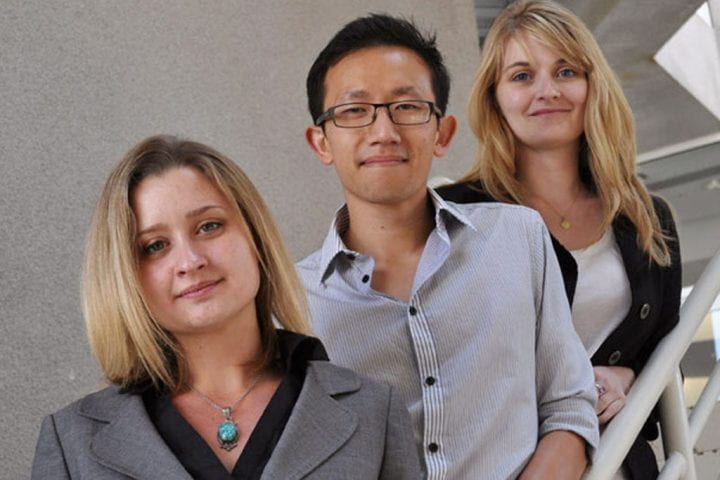Safe haven

When she enrolled in UC Irvine’s School of Law, Susan Lewis figured she’d someday become an attorney at a private firm. Then she signed on for the kind of hands-on, pro bono work the law school endorses as part of its commitment to public service, and her career plans changed.
Lewis joined the Iraqi Refugee Assistance Project, a student-driven organization that helps individuals and families displaced by war and sectarian violence resettle in the U.S. or another safe country. In January, she traveled to Jordan and met some of the Iraqi refugees, including her first IRAP client: a shy young man who fled Iraq after an inter-tribal conflict that led to death threats.
Her involvement has had a profound effect on her own aspirations.
“I’d been trying to find my path in law school, and this cemented my interest in human rights work,” says Lewis, who’s now in her second year. “I want to pursue public interest law. I realize there are a lot of people who need help.”
For UCI law students, IRAP offers an opportunity to gain legal experience and commit to something greater than themselves. Founded in 2008 by Yale University law students, it provides legal assistance to refugees and helps them navigate the complicated resettlement process. IRAP now has chapters at nine law schools; UCI’s is the only one in Southern California.
“These refugees have a sense of desperation. That’s why IRAP’s work is so important. It gives them hope,” Lewis says.
During the nine-day trip to Jordan, she and fellow UCI law students Sam Lam and Lauren Gruber researched cases, met refugees and aid representatives, and learned how refugee law operates in the real world.
Most IRAP clients are Iraqis who have fled their homes and are stranded in other countries, primarily Jordan and Syria, while seeking resettlement. Because they’re not residents, they can’t work. Most live in shacks that have leaky roofs and no plumbing, Lam says.
Also a second-year student, he got involved in IRAP after receiving an e-mail from UCI law professor Jennifer Chacon asking for volunteers to work on a refugee’s case.
“I replied within five minutes,” Lam says. “I’m the son of refugees, so I tend to side with the outsider — and there’s no bigger outsider than someone who doesn’t belong to any country.”
In 1975, during the final days of the Vietnam War, his mother — then a teenager living in an orphanage — escaped Saigon in a helicopter. His father, a paratrooper with the South Vietnamese army, left on a U.S. vessel with American soldiers.
“When I hear refugees talk about their experiences, I think, ‘These are my parents’ and my relatives’ stories,'” Lam says. “The names and countries are different, but it’s the same story of the refugee.”
As of last October, nearly 200,000 Iraqis had registered with the Office of the United Nations High Commissioner for Refugees, but the agency estimates that the actual number of displaced persons who have abandoned their homes but are still in Iraq or neighboring countries is more than 1.5 million. IRAP gets most clients from the UNHCR, which processes appeals from those who have been denied asylum.
The law students, working under the supervision of pro bono attorneys, help prepare visa applications, submit appeals and act as the refugees’ advocates. So far, IRAP has filed more than 200 cases and won all but one — when the client dropped out.
In his first case, Lam and UCI law student Mohammed Elayan helped an Iraqi man who had fled his country to avoid persecution. He had been in detention in the U.S. for months because he lacked the necessary immigration documents.
“I didn’t realize how tired he was until I met him,” says Lam, who worked on his case from December 2009 to August 2010. “All he wanted was resolution.”
Along with his supervising attorney and classmate, Lam presented the case before a federal immigration judge, who ultimately ordered “withholding of removal,” allowing the client to legally remain in the U.S.
UCI law students are currently assisting on half a dozen IRAP cases.
“Sam, Susan and Lauren are three outstanding individuals who embody the sustained commitment to public service shared by so many of our law students,” Chacon says. “It’s exciting to see students who are already making a difference for people through their pro bono work.”
Like Lewis, Lam says IRAP has motivated him to pursue a career advocating for human rights. “I knew I wanted to help others — that’s why I went to law school — but I wasn’t sure how,” he says. “This has given me a new sense of purpose.”
He adds: “Some people ask, ‘Why should we care about these people? They’re not citizens.’ My answer is, ‘They’re human beings.'”
Originally published in ZotZine Vol. 3, Iss. 6

